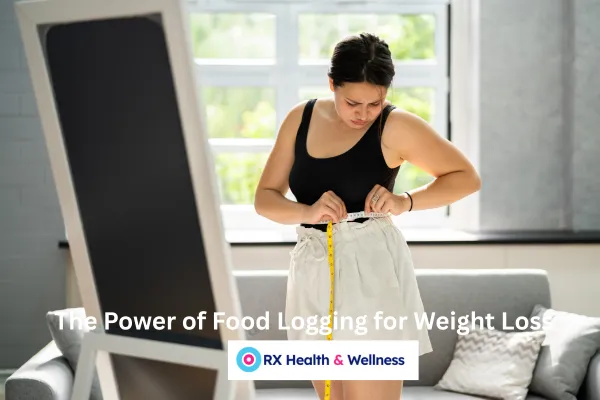
The Power of Food Logging for Weight Loss
The Power of Food Logging for Weight Loss
Losing weight—and keeping it off—isn’t just about willpower. It’s about awareness, consistency, and understanding your relationship with food.
One of the simplest and most powerful tools to support this process is food logging. Tracking what you eat helps you uncover hidden habits, emotional triggers, and portion patterns that often go unnoticed.
Let’s explore how mindful food logging can help you take back control of your health and make lasting changes.
Why Food Logging Works
1. Awareness Is the First Step to Change
When you track what you eat, you create a moment of mindfulness between intention and action.
Research shows that people who keep a food diary lose twice as much weight as those who don’t.
Reference: Hollis JF et al., Am J Prev Med, 2008.
Whether you use a paper journal or an app like Lose it or MyFitnessPal, tracking helps you identify patterns like:
Skipping meals and overeating later
Stress or boredom snacking
Underestimating calories or carbs
Missing protein and fiber-rich foods
This awareness helps you make small, powerful shifts that lead to big results.
2. It’s Not About Perfection — It’s About Progress
Logging isn’t about judgment; it’s about learning. Many of my clients start by saying, “I eat healthy,” but once they start tracking, they realize they’re:
Eating too few vegetables or the same 1–2 over and over
Not getting enough protein for blood sugar balance
Grazing throughout the day without realizing it
Your log becomes your mirror, showing where real improvement can happen.
“You can’t change what you don’t track.”
What to Track
To get the most benefit, record these key details daily:
All meals, snacks, and beverages— yes, even the “small bites.”
Portion sizes— use your hand or a kitchen scale for accuracy.
Macronutrients— focus on protein, fiber, and healthy fats while reducing refined carbs.
Emotional triggers— note your mood before and after eating to identify patterns.
Hydration— dehydration can mimic hunger, leading to overeating.
If you’re following a low-carb or blood-sugar-friendly plan, pay close attention to carb quality—choose whole, unprocessed sources like non-starchy vegetables, legumes, and small portions of whole grains or sweet potatoes.
The Functional Medicine Viewpoint
From a functional medicine perspective, food logging isn’t just a weight-loss tool—it’s a diagnostic tool. It helps uncover:
Nutrient gaps (missing minerals, protein, or antioxidants)
Gut triggers (bloating, fatigue, or cravings after certain meals)
Blood sugar imbalances that lead to energy crashes and mood swings
Over time, this data can guide personalized nutrition changes that support metabolic health, hormone balance, and longevity—not just a smaller waistline.
Best Food Logging Apps
If you prefer digital tools, here are some top-rated options:
MyFitnessPal– Large food database; syncs with fitness trackers.
MyNetdiary- offers a large database of foods with an easy-to-navigate interface that scores big points with users.
Lose It!– Simple, goal-oriented interface with barcode scanning.
WeightWatchers - is new and improved with their next-gen program. You'll now find over 150 new ZeroPoint Foods (foods you don’t have to weigh, track or measure on the program), access to dietitians for personalized nutrition counseling (covered by insurance) and detailed insights on macronutrients in the app.
Noom– Designed by psychologists, nutritionists and personal trainers, You'll get individualized coaching to guide you to your goals with a customized plan, with an emphasis on cognitive behavioral therapy techniques to help you understand the "why" behind your eating habits.
Each offers free and premium versions, available on iOS and Android.
From My Own Journey
When I began food logging, I thought I had a “healthy diet.” But I quickly discovered patterns I wasn’t aware of:
I skipped breakfast too often
My “healthy snacks” had more sugar than I realized
I was under-eating protein and fiber
Logging didn’t just change what I ate—it changed how I thought about food. It helped me shift from emotional eating to empowered eating.
Final Thoughts: Track to Transform
If you’re serious about reaching your goals—whether it’s weight loss, better blood sugar control, or more energy—food logging is one of the most effective habits you can build.
It’s not forever, but it’s the foundation for self-awareness and accountability.
Remember: people who log their food consistently are more likely to lose weight and keep it off long-term.
Reference: Burke LE et al., J Acad Nutr Diet, 2012.
Start small. Be consistent. And use your log as a tool for progress, not perfection.
📚References
Hollis JF, et al.Weight loss during the intensive intervention phase of the Weight-Loss Maintenance trial.Am J Prev Med.2008;35(2):118–126.
Burke LE, et al.Self-monitoring in weight loss: A systematic review of the literature.J Acad Nutr Diet.2012;112(1):92–102.
Wing RR & Phelan S.Long-term weight loss maintenance.Am J Clin Nutr.2005;82(1 Suppl):222S–225S.
